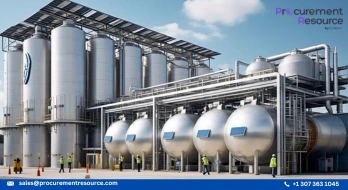KBR was Appointed as Project Manager for BP's Worldwide Hydrogen Portfolio
.webp)
KBR, Inc. (Houston) has been chosen as BP's lead integrated project management contractor for the company's global hydrogen project portfolio.
KBR will put its Integrated Project Management Team's collaborative work practises and experience to use. The IPMT will provide services required for the safe, effective, and high-quality delivery of projects, such as performance management of individual projects and relevant subcontractors.
The contract scope includes shared contributions to the front-end, optimisation, and execution project phases, as well as management assistance for BP's global hydrogen projects during construction, commissioning, and startup. The contract will begin under the terms of the current global agreement with BP.
Proliferating Hydrogen and its Significant Strides
There is a growing understanding that hydrogen will play an important role as a cleaner energy source in our quest to achieve net zero carbon emissions by 2050. That is why several countries, from Australia to the Netherlands, Japan to Singapore, are now taking it seriously. The excitement is apparent, and stakeholders are attempting to define what a fully-fledged hydrogen sector would look like.
Request Access For Regular Price Update of RBD Palm Oil
Achieving the status of hydrogen superpower is now an attainable aim for a number of countries, industrial participants, policymakers, and energy titans. This form of energy might contribute to up to 12% of world energy consumption by 2050, reducing 80 gigatonnes of CO2 emissions by that time. The current annual global demand for hydrogen is projected to be 70 million tonnes.
Even while the blueprint for success is still being debated, the pressure for change is at an all-time high. At the recent World Hydrogen Summit in Rotterdam, this was the attitude.
Hydrogen has the ability to rewrite the energy infrastructure map because energy production will migrate to areas that are spent extensively in linked infrastructure, renewable energy, logistics, and transportation of this power vector.
The future is hydrogen, but we are still in the early stages." Supply chains have yet to be established, and economies of scale have yet to be realised. Many players' desires do not meet reality on the ground, but there is a lot of promise," explains Nikunj Panchal, Global Operations Director at KBR Sustainability Advisory Consulting.
The conflict in Ukraine has heightened awareness of the 'energy trilemma,' or the need to find more sustainable, secure, and inexpensive energy sources other than gas, oil, and coal. As the global energy system transforms, the race to net zero carbon emissions is sharpening minds on where to focus investments and where present systemic concerns exist.
"These are dynamic instances, and the hydrogen economy is gaining traction." "Key players in this sector, including global energy companies, prominent key gateway ports, logistic giants, and progressive nation states," adds Ben Sawford, Global Vice President for KBR Sustainability Advisory Consulting.
A fledgling but promising industry
Currently, total investment for hydrogen projects and along the full value chain is anticipated to be USD 500 billion through 2030. There are presently 500 large efforts worldwide, with USD 160 billion in corporate investment and USD 70 billion in public support pledged. The industry's momentum is picking up. Other difficulties exist in addition to technological, financial, and industrial leadership.
"The process is currently far too complicated. Businesses, industries, investors, policymakers, government leaders, and the scientific community must all work together to make hydrogen a reality," says Panchal.
There is also a growing recognition that, as many industry stakeholders debate the relative merits of green, blue, grey, or pink hydrogen, with varying degrees of emissions reduction, they are paralysed in our inaction. At this point, it doesn't matter what colour hydrogen is, whether it comes from fossil fuels with carbon capture or from nuclear power, as long as they focus on the journey of establishing hydrogen infrastructure and cleaner energy sources.
Currently, the hydrogen sector is in its infancy, infrastructure is scarce, and scaled-up deployment is a critical challenge. The initial research and costs of technology are also enormous, as are investments in bulk processing, storage, and distribution, as well as related safety and security considerations.
With hydrogen, an ecosystem approach is required. You need new storage facilities, pipelines, and logistics to transfer it, and off-takers. All of this hydrogen infrastructure must be built at the same time. Every element of this is dependent on the development of every other element.
The growth of the natural-gas sector can serve as a model for the expansion of the hydrogen economy. The growth of LNG required the kind of knowledge and capital investment that only the integrated global energy giants could provide.
A Swiss Army knife brings about transformation
Hydrogen's properties have also earned it the moniker "the Swiss Army knife of decarbonisation," as long as it can be produced with little or no carbon emissions. This is owing to the fact that hydrogen may be utilised for a variety of purposes, including fueling cargo ships and powering heavy-duty trucks. It can also be used to power chemical or steel companies, generate electricity, and even store energy.
Hydrogen may be transformed to ammonia, a more energy-intensive fuel that is easier to transport than hydrogen.
To reduce its contribution of greenhouse gas emissions, the global shipping industry is eyeing to deploy ammonia to power cargo ships.
Read More About Hydrogen Production Cost Reports - REQUEST FREE SAMPLE COPY IN PDF
According to the International Maritime Organization, international shipping contributes for almost 3% of global greenhouse gas emissions. It is a serious emitter that must be addressed. The goal is to reduce shipping emissions by 40% by 2030, with plans to reduce them by 70% by 2050.
This is why major ports around the world, from Singapore to Tianjin, Jebel Ali to Los Angeles, may play a critical role as nodes of investment, realization, and delivery of a fully-fledged hydrogen economy. The Port of Rotterdam, for example, aims to import up to 20 million tonnes of hydrogen by 2050.
Ports as nodes for the hydrogen economy are a critical concept and development. Key logistical hubs may consider importing and processing hydrogen, ammonia, or other cleaner fuels. Ports can then employ these clean fuels to power cargo ships, provide logistical support, or transport industries onward. This fundamentally alters the financial model of these gateways. So-called hydrogen ports, as confined nodes, and ecosystems in their own right, become considerably more bankable as projects," explains Sawford.
As per Procurement Resource, the hydrogen economy is no longer an abstract concept. Today, governments and industry throughout the world are investing billions of dollars to kickstart a cleaner hydrogen revolution. It has the potential to make a significant difference when scaled up.
There is a growing consensus that hydrogen will play an important role as a cleaner energy source in our effort to attain net zero carbon emissions by 2050. That is why various countries, ranging from Australia to the Netherlands, Japan to Singapore, are now taking it seriously. The excitement is palpable, and stakeholders are seeking to define what a fully-fledged hydrogen sector would entail.

.webp)

